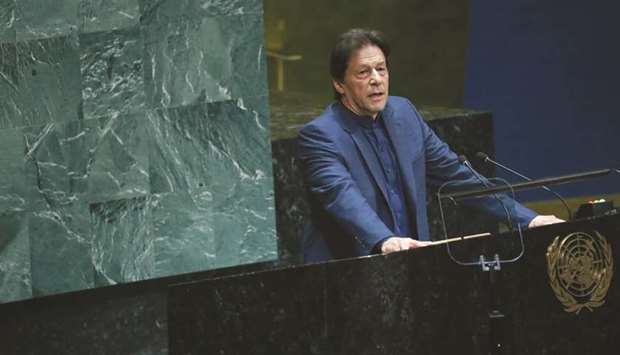Pakistani Prime Minister Imran Khan has unveiled a financial relief package worth around Rs1.2tn to ward off the negative impact of the coronavirus on the country and the economy.
The package included a reduction in the prices of petrol, diesel and kerosene by Rs15 per litre, the approval of a Rs3,000 monthly stipend for daily wage earners, and a rescue package for exporters and industrialists.
While talking to a select group of journalists, the PM also announced tax breaks on the import of pulses, waived off duty on import of palm oil, and reduced the levy on petroleum products.
“We have provided a relief package to the tune of Rs1.2tn, as it did not incorporate tax relief provided through abolishing/reducing taxes on pulses and palm oil,” Federal Minister for Economic Affairs Hammad Azhar said, when asked about the exact financial impact of relief package announced by the premier.
Azhar said the reduction in Petroleum Levy on POL products would cost the government Rs75bn over the next three months.
He also claimed that the decision to allow consumers to pay their electricity and gas bills in installments would cost of Rs70bn and Rs30bn for power and gas companies respectively.
The PM also announced a relief package for industries and exporters to the tune of Rs200bn, and said that the FBR was instructed to release Rs100bn sales tax refunds on an immediate basis.
It will help improving liquidity crunch being faced by the exporters, he added.
PM Imran said that the principle and mark-up of loans would also be deferred with the help of the Rs100bn.
He further noted that small and medium-sized enterprises (SME) would be provided concessional loans and their mark-up payments would also be deferred.
“The government has allocated Rs150bn to provide a Rs3,000 monthly stipend to daily wage earners.
The centre will also involve provinces to expand coverage of the programme for maximum beneficiaries,” he said.
“The government has increased additional allocation of Rs50bn for Utility Stores Corp (USC) so that provision of essential food items at affordable prices could be ensured,” the premier announced, adding that Rs280bn had been set aside for procurement of wheat.
The PM also announced slashing prices of petroleum products by Rs15 per litre, including diesel, petrol and kerosene, with immediate effect.
The government estimated that it was going to face hit of Rs75bn on its petroleum levy over the next three months.
Answering a query, Advisor to PM on Petroleum replied that the POL prices would be further reduced if the existing trend of reduced prices persisted in the international market.
The PM also announced allocation of Rs50bn for the procurement of medical equipment.
He added that a tax reduction on items such as on import of pulses, palm oil, and others had been approved too.
PM Imran announced Rs100bn for emergency relief in order to spend on sectors where there is increasing requirement in the wake of evolving situation because of outbreak of coronavirus.
The PM also allocated Rs25bn for National Disaster Management Authority (NDMA). He also announced that he would unveil special relief package for construction sector in the next few days as it would help to kick-start different industries and would provide jobs at this difficult times.
The journalists present on the occasion raised critical questions over the non-elected representatives of economic team, laid back monetary policy, and prescription of wrong economic policies.
The PM replied that he was responsible for all policies of his government.

Imran Khan, Pakistan’s prime minister, speaks during the UN General Assembly meeting in New York.
